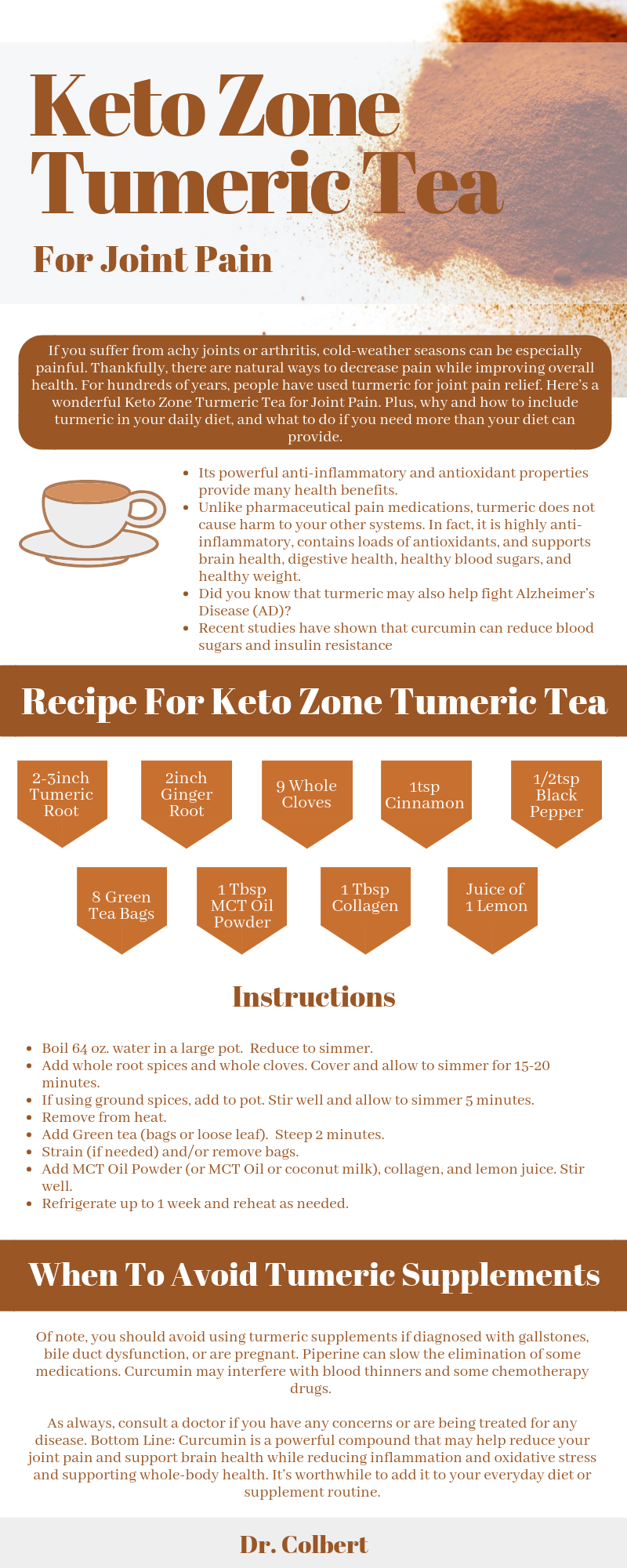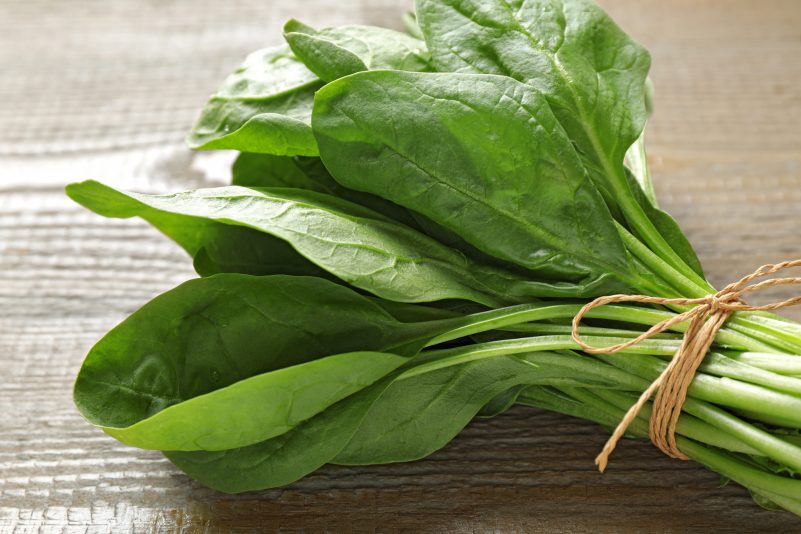When cold weather hits, some people feel it in their bones.
If you suffer from achy joints or arthritis, cold-weather seasons can be especially painful. Thankfully, there are natural ways to decrease pain while improving overall health.
For hundreds of years, people have used turmeric for joint pain relief.
Now, many studies show that its benefits can go far beyond pain.
Here’s a wonderful Keto Zone Turmeric Tea for Joint Pain. Plus, why and how to include turmeric in your daily diet, and what to do if you need more than your diet can provide.
Keto Zone Turmeric Tea for Joint Pain
Ingredients:
- 2-3 inches whole turmeric root, peeled and cut in 1/4 inch slices OR 2 tsp ground turmeric
- 2 inches whole ginger root, peeled and cut in 1/2 inch slices OR 2 tsp ground ginger
- 9 whole cloves OR 1/2 tsp ground cloves
- 1 tsp cinnamon
- ½ tsp black pepper
- 8 green tea bags or similar amount of whole leaf tea
- 1 Tbsp. MCT Oil Powder, MCT Oil or 2 Tbsp. coconut milk
- 1 Tbsp. Collagen
- Juice of 1 lemon
Instructions:
- Boil 64 oz. water in a large pot. Reduce to simmer.
- Add whole root spices and whole cloves. Cover and allow to simmer for 15-20 minutes.
- If using ground spices, add to pot. Stir well and allow to simmer 5 minutes.
- Remove from heat.
- Add Green tea (bags or loose leaf). Steep 2 minutes.
- Strain (if needed) and/or remove bags.
- Add MCT Oil Powder (or MCT Oil or coconut milk), collagen, and lemon juice. Stir well.
- Refrigerate up to 1 week and reheat as needed.
Turmeric for Joint Pain and More
Turmeric is a spice derived from underground roots. It is part of the ginger root family and contains a strong compound called curcumin. Curcumin makes up 2-6% of the weight of turmeric.
What’s so special about curcumin?
Its powerful anti-inflammatory and antioxidant properties provide many health benefits.
Turmeric Can Relieve Joint Pain
While it’s still unknown exactly how curcumins work to decrease joint pain, turmeric’s effects are well documented as effective. A recent meta-analysis of curcumin studies concluded that the curcumins in turmeric extract were effective in treating arthritis (1). What’s more, animal studies show that curcumins protect cartilage. (2).
Additionally, a study of 50 people who suffer from arthritis found a 58% decrease in stiffness and pain after 90 days with curcumin treatment. In fact, the participant’s C-reactive protein, a marker for inflammation, decrease by 16-fold!
The best part?
Unlike pharmaceutical pain medications, turmeric does not cause harm to your other systems. In fact, it is highly anti-inflammatory, contains loads of antioxidants, and supports brain health, digestive health, healthy blood sugars, and healthy weight.
Turmeric Helps Reduce Inflammation and Oxidative Stress
You can lower your body’s inflammation in two key ways.
First, you can consume foods with nutrients that are anti-inflammatory and full of antioxidants. Examples of these nutrients are curcumin, eugenol found in cloves, gingerols in ginger, and omega-3s in fatty fish.
Second, you can avoid foods and fats that promote inflammation. Simple sugars, concentrated omega-6 fats like soybean oil (which work against omega-3s), and processed foods promote inflammation.
For a one-two health punch, replace any processed or sugary drink with the Keto Zone Turmeric Tea for Joint Pain this winter.
And there’s more.
Turmeric for Brain Health
Did you know that turmeric may also help fight Alzheimer’s Disease (AD)?
Amazingly, epidemiologists have found rates of AD to be less than 25% of those in the United States in people who consume 200-300 mg of curcumin per day.
In fact, small studies of patients with advanced dementia and Alzheimer’s disease have also shown improvements in cognitive and behavioral symptoms (3) with turmeric treatment. Some researchers believe turmeric may be able to prevent or reverse plaques in the brain associated with these diseases.
Blood Sugar Balance and Weight Loss
Achieving a healthy weight and stable blood sugars is one of the best things you can do for your overall health. Thankfully, turmeric can help.
Specifically, recent studies have shown that curcumin can reduce blood sugars and insulin resistance (4).
What’s more, a study published in 2015 with 44 participants found greater than 3% extra weight loss with a curcumin treatment. These participants also decreased more body fat, waistlines, and BMI.
Need More Turmeric In Your Diet? Here’s How
Now, you’ll likely want to use turmeric for joint pain and more in your everyday diet.
This is great, but there are a few caveats.
Curcumin needs a bit of help to be well-absorbed in the gut, and a bit more to make sure it gets delivered into the bloodstream without being disassembled.
First, adding fat like that found in MCT Oil, MCT Oil Powder, or coconut milk increases its absorption in the gut.
Second, piperine (a compound in black pepper), significantly increases its availability in the bloodstream.
If you need a therapeutic dose of turmeric beyond that found in your everyday food, consider supplementing. Many people find great pain-relieving results with just 700-1000 milligrams of curcumin per day when it’s mixed with piperine in supplements.
When to Avoid Turmeric Supplements
Of note, you should avoid using turmeric supplements if diagnosed with gallstones, bile duct dysfunction, or are pregnant.
Piperine can slow the elimination of some medications. Curcumin may interfere with blood thinners and some chemotherapy drugs.
As always, consult a doctor if you have any concerns or are being treated for any disease.
Bottom Line: Curcumin is a powerful compound that may help reduce your joint pain and support brain health while reducing inflammation and oxidative stress and supporting whole-body health. It’s worthwhile to add it to your everyday diet or supplement routine.

















